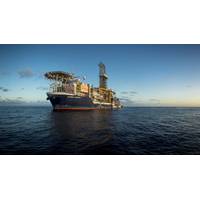Oil Firms in Norway to Drill 18% Less Exploration Wells by 2026, Survey Finds

A survey on Thursday showed that oil firms in Norway are planning to drill 18% less exploration wells next, as they focus on existing fields. This could undermine the government's aim of maintaining production from Europe's biggest petroleum producer.Offshore Norway's survey of its members shows that drilling and investment will decline next year.The survey revealed that oil companies on the Norwegian continental Shelf, such as Equinor Aker BP Vaar Energi, intend to drill 37 exploration wells by 2026.
Qatar to Leave OPEC

Qatar said on Monday it was quitting OPEC from January to focus on its gas ambitions, taking a swipe at the group's de facto leader Saudi Arabia and marring efforts to show unity before this week's meeting of exporters to tackle an oil price slide.Doha, one of OPEC's smallest oil producers but the world's biggest liquefied natural gas (LNG) exporter, is embroiled in a protracted diplomatic row with Saudi Arabia and some other Arab states.Qatar said its surprise decision was not driven by politics but in an apparent swipe at Riyadh…
Guyana Puts Oil Auctions on Hold

Guyana has put planned oil auctions on hold as the impoverished South American country works to establish a Department of Energy to oversee the energy boom, Minister of State Joseph Harmon said on Monday.Since 1999, Guyana has awarded a group led by Exxon Mobil Corp hundreds of oil blocks along Guyana's maritime borders with Venezuela and Suriname. Their finds are turning Guyana, a country with no history of oil production and relaxed energy regulation, into one of Latin America's hottest prospects for oil investments.Exxon…
New Offshore Oil Investments Needed to Avoid Shortages -Hess

Higher investments in offshore oil production are critical to avoiding a supply squeeze by 2020, as expanding shale output will not match projected demand increases in the next few years, U.S. oil producer Hess Corp said on Thursday. The past four years of low oil prices have major producers pulling back on needed offshore investment, and the gap between supply and demand should help prices rebound, Hess Chief Operating Officer Greg Hill said at an energy conference at Rice University's Baker Institute.
Saudi Aramco to Sign Yunnan Refinery Deal in 6 Months
Saudi Aramco is expected to sign a final deal with PetroChina, China's second-largest state-run refiner, within six months to invest in its Yunnan refinery, Saudi Arabia's Energy Minister Khalid al-Falih told Reuters on Wednesday. The world's top oil exporter aims to push ahead with its oil investments in China to become the country's biggest source of crude supply and a major player, Falih said. "Yunnan (talks) have reached advanced stages ... We aim to finalise Yunnan within six months," Falih, who is also the chairman of Aramco, said.
Drop in Oil Investments a Drag on Norway's Economy

The sharp decline in investments by oil firms is a significant problem for Norway's economy, central bank Governor Oeystein Olsen said on Friday. "The fall is significant and a strongly negative impulse hitting the Norwegian economy," Olsen told a business conference. "We get a negative impulse, which will be challenging in the time to come," he added. Norges Bank on Thursday kept its key policy interest rate unchanged at a record low 0.5 percent and said it would most likely stay around that level in coming years, although it saw a slightly higher probability of a cut than of an increase.
Iran Oil Chief to Expected to Expedite Oil Major Deals
Zanganeh ally made new head of national oil firm; Kardor expected to speed up deals with oil majors. Oil minister Bijan Zanganeh has handed the running of Iran's national oil company to a trusted ally in a push to agree long-awaited deals with global oil majors, which could be derailed by next year's presidential polls. Iran has pledged to open up its lucrative oil reserves, the world's fourth largest, although hardline rivals of reformist President Hassan Rouhani have opposed the new contracts, saying Iranian natural resource reserves cannot be owned by foreigners.
Norway's Offshore Shipping Sector Faces Bleak Year
Norwegian companies that provide supply ships and drilling rigs to the global oil industry face a bleak year ahead as contracts disappear and financing options dwindle in the face of weak global crude prices. They could increasingly be forced to sell or write down the value of assets, cut jobs and tap shareholders for cash to weather the downturn, according to industry experts. This would herald more pain for Norway, where the overall oil sector accounts for about a fifth of the economy and unemployment is rising, especially in the oil capital Stavanger and its environs on the west coast.
Gulf Producers Delay Field Work
Gulf exporters cutting cost, ask for discounts. Gulf oil producers are delaying some field maintenance until next year to keep production high and reduce costs as they forecast weaker oil prices in 2016, industry sources said. It was not possible to clarify which fields were affected - information which is highly sensitive. But it showed that Gulf oil producers aim to keep pumping hard as they expect weak oil prices next year when sanctions on Iran are lifted allowing it to export more to an oversupplied market, the sources said.
IEA: Governments Shouldn't Count on Cheap Oil: IEA
Investments to drop for 2nd year in 2016; may see 400,000 bpd U.S. light tight oil output cut in 2016. Countries should not bank on oil prices remaining low when formulating their energy policies, as supplies could tighten from mid-2016 due to a drop in investment and falling U.S. output, a senior industry official said on Monday. Global oil prices have more than halved since June 2014 on rising U.S. shale oil output and as members of the Organization of the Petroleum Exporting Countries (OPEC) decided to defend market share rather than cut production.
Oil Higher but Glut Swells Storage
Investors eye outcome of two-day Fed meeting; Oil investments could fall two years in a row - IEA. Oil edged higher on Monday as investors prepared for a week of important economic indicators, but prices remained range-bound on indications that the global storage was nearing capacity. Brent, the international benchmark, was up 21 cents at $48.20 a barrel at 1133 GMT, 11 percent below this month's high. U.S. crude futures traded up 26 cents at $44.86 a barrel. "Today, we have a consolidation in the price of oil.
$70 Global Oil Price Needed - Venezuela's Maduro
The global price of oil, which has slid more than half in the last year, should be a minimum $70 per barrel in order for necessary petroleum investments to be maintained, Venezuela's President Nicolas Maduro said. OPEC member Venezuela relies on crude for more than 95 percent of revenues and is one of the worst-hit producers by the fall in prices from more than $100 a year ago. Brent futures were at $48.43 on Tuesday, while U.S. crude was at $45.05 a barrel. "All the big oil investments need, at a minimum, a price of $70 to be sustainable," Maduro said at a Cabinet meeting late on Monday night.
Venezuela's Maduro pushes for OPEC heads of state summit
Venezuelan President Nicolas Maduro has suggested to the Emir of Qatar a summit for heads of state of OPEC countries to defend oil prices, an idea he said the leader of the Arab Gulf state "liked". "I made the proposal, he liked the idea, he said he was in agreement with the idea, and as president of our organization for summits he will make the necessary consultations," Maduro said in an interview with television channel Telesur on Saturday. The Venezuelan leader, who met with the emir…
Norway's Oil Investment Forecast May Have to be Cut
Norwegian oil investments may drop more than earlier expected if oil prices stay at their current level, as the most recent projections were based on much higher crude prices, Bente Nyland, the head of the Norwegian Oil Directorate said. "The investment forecast was based on an oil price of around $85-$90 per barrel and it might have to be revised if the oil price stays at this level," Nyland said. Brent crude was trading below $57 per barrel on Wednesday. The NPD earlier predicted…
Norway's Oil Sector Repeating Mistakes of last Downturn?
Some 10 pct of oil workers laid off; Energy sector at risk of cutting too much. Norway's offshore energy sector may be repeating the mistakes of the last big oil slump, removing too much capacity too soon and leaving the industry unprepared for any eventual rebound, senior sector insiders said. Faster than many others, western Europe's biggest oil producer is scrapping assets and laying off highly skilled workers even though rebuilding this capacity to meet future demand will be costly, time consuming and likely to accelerate cost inflation.
Norway Oil Lobby's 2015 Outlook is Dim
Norwegian oil and gas investments will fall to around 197 billion crowns ($28.9 billion) next year from 221 billion crowns in 2014, the Norwegian Oil and Gas Association, the industry's lobby group said on Tuesday. Oil investments will then level out and hold between 190 billion crowns and 205 billion crowns per year throughout 2019, the association said in a report. Investments are seen at 192 billion crowns in 2016, 190 billion in 2017, 205 billion in 2018 and 198 billion in 2019, when measured in 2014 crowns. Reporting by Gwladys Fouche
Low Prices Threaten Arctic, UK Fields
Over 1 bln barrels could stay in the ground. Arctic Norway, mature British fields most vulnerable. British, Norwegian oil investments set for sharp falls but ongoing UK projects, Sverdrup to go on. Big oil and gas finds in waters along Europe's northern edge may remain undeveloped now that oil prices have dropped, keeping potential supply of over a billion barrels of oil equivalent out of the market for the foreseeable future. Discoveries in Arctic Norway could stay dormant, while…
Norway's Oil & Gas Investment to See Steeper Fall
Investments seen falling 13.9 pct in 2015 vs 2014; investments were seen down 12.3 pct over same time in June. Crown weakens after data. Norway's oil and gas investments, a key ingredient of economic growth, are expected to fall more than expected in 2015, a survey showed on Wednesday, weakening the crown and increasing the chance interest rates will be kept low. Investment on the Norwegian continental shelf (NCS) is now expected to fall 13.9 percent in 2015 from 2014, a faster rate than the 12.3 percent year-on-year drop expected in June…
Norway's 2015 Oil Investments to Fall, Weigh on Economy
Norway's oil and gas investments, a key economic growth factor, will fall sharply in 2015, an official survey showed on Thursday, increasing chances that the central bank will keep interest rates low for an extended period. Investments in the Norwegian continental shelf (NCS) were expected to come in at 182.4 billion crowns ($30.39 billion) in 2015, a 12 percent drop compared with the initial estimate for 2014, published in June last year, and the lowest comparable level since 2012.